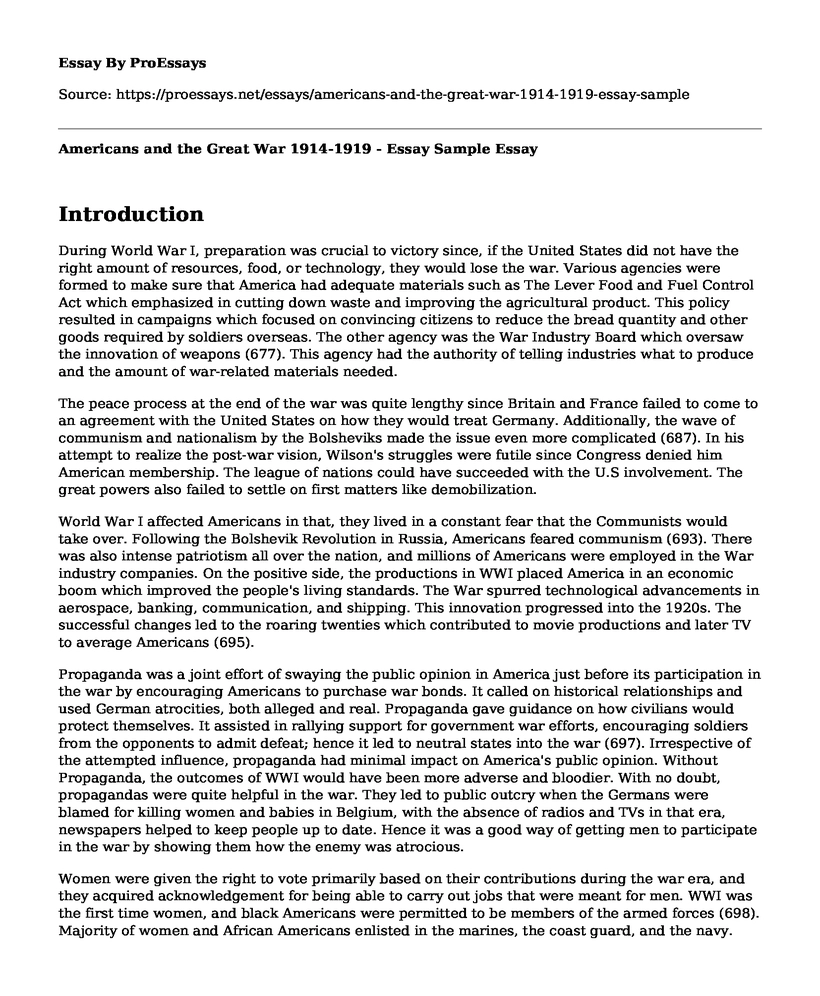Introduction
During World War I, preparation was crucial to victory since, if the United States did not have the right amount of resources, food, or technology, they would lose the war. Various agencies were formed to make sure that America had adequate materials such as The Lever Food and Fuel Control Act which emphasized in cutting down waste and improving the agricultural product. This policy resulted in campaigns which focused on convincing citizens to reduce the bread quantity and other goods required by soldiers overseas. The other agency was the War Industry Board which oversaw the innovation of weapons (677). This agency had the authority of telling industries what to produce and the amount of war-related materials needed.
The peace process at the end of the war was quite lengthy since Britain and France failed to come to an agreement with the United States on how they would treat Germany. Additionally, the wave of communism and nationalism by the Bolsheviks made the issue even more complicated (687). In his attempt to realize the post-war vision, Wilson's struggles were futile since Congress denied him American membership. The league of nations could have succeeded with the U.S involvement. The great powers also failed to settle on first matters like demobilization.
World War I affected Americans in that, they lived in a constant fear that the Communists would take over. Following the Bolshevik Revolution in Russia, Americans feared communism (693). There was also intense patriotism all over the nation, and millions of Americans were employed in the War industry companies. On the positive side, the productions in WWI placed America in an economic boom which improved the people's living standards. The War spurred technological advancements in aerospace, banking, communication, and shipping. This innovation progressed into the 1920s. The successful changes led to the roaring twenties which contributed to movie productions and later TV to average Americans (695).
Propaganda was a joint effort of swaying the public opinion in America just before its participation in the war by encouraging Americans to purchase war bonds. It called on historical relationships and used German atrocities, both alleged and real. Propaganda gave guidance on how civilians would protect themselves. It assisted in rallying support for government war efforts, encouraging soldiers from the opponents to admit defeat; hence it led to neutral states into the war (697). Irrespective of the attempted influence, propaganda had minimal impact on America's public opinion. Without Propaganda, the outcomes of WWI would have been more adverse and bloodier. With no doubt, propagandas were quite helpful in the war. They led to public outcry when the Germans were blamed for killing women and babies in Belgium, with the absence of radios and TVs in that era, newspapers helped to keep people up to date. Hence it was a good way of getting men to participate in the war by showing them how the enemy was atrocious.
Women were given the right to vote primarily based on their contributions during the war era, and they acquired acknowledgement for being able to carry out jobs that were meant for men. WWI was the first time women, and black Americans were permitted to be members of the armed forces (698). Majority of women and African Americans enlisted in the marines, the coast guard, and the navy. Despite having these opportunities, blacks faced racial discrimination. They were often categorized as unfit for war Abd were nor permitted to be on the frontlines.
Cite this page
Americans and the Great War 1914-1919 - Essay Sample. (2022, Dec 03). Retrieved from https://proessays.net/essays/americans-and-the-great-war-1914-1919-essay-sample
If you are the original author of this essay and no longer wish to have it published on the ProEssays website, please click below to request its removal:
- History Essay: Ancient Egypt and Mesopotamia. Ancient Minoan and Western Civilization
- Time Period Impact to Forest Groundwater Levels Saltwater Intrusion Farming Industrial Development Population
- Factors That Led to American Victory in WW2 Essay Example
- Research Paper on Early American History (1619 to 1877)
- Essay Example on Explore Greek Polytheism: A Burkert Account
- Civil War Improved US Living Standards: Essay Sample on Hospitals & Ambulance
- Essay Sample on Galileo's Discovery of Moon's Surface Reverses Early Theories







